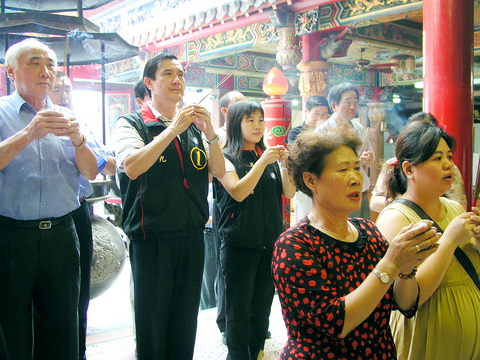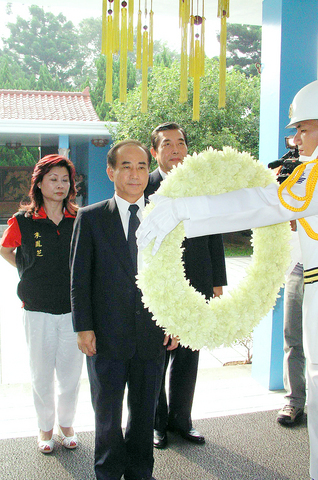Despite claims that he would not intervene in the election for Chinese Nationalist Party (KMT) chairman, People First Party Chairman James Soong (宋楚瑜) yesterday, on election eve, came down on the side of Legislative Speaker Wang Jin-pyng (王金平).
Wang last night broadcast a videotaped message to a campaign rally that sealed Soong's support for Wang over his rival, Taipei Mayor Ma Ying-jeou (
"[In the tape, Soong] did not bring up my election bid. However, his meaning is clear. He hopes that I will win," Wang said at the legislature earlier yesterday.

PHOTOS: HSU PAI-YING AND CHOU MIN-HUNG, TAIPEI TIMES
Before leaving the country for an extended vacation in the US, Soong presented Wang's campaign headquarters with the tape.
In a further hint of where PFP support lies, PFP policy research center director Chang Hsien-yao (張顯耀) urged voters to support Wang in Nantou on Thursday night, while a number of PFP legislators, including Deputy Legislative Speaker Chung Jung-chi (鍾榮吉), made appearances at Wang's rally last night in Taipei.
In response, Ma, campaigning in Pingtung County yesterday, said that he relied on ideals and not on personal connections.

"The reason why [other pan-blue camp members] left the KMT was mostly because of dissatisfaction with the KMT's past affiliation with `black gold' [corruption] and policy direction," Ma said.
"Most importantly, the KMT must find its original direction, to support the Republic of China, oppose Taiwanese independence and oppose the `one country, two systems' policy. If these things can be accomplished, then some members of the PFP and the New Party would consider returning to the KMT," Ma said.
Meanwhile, the KMT yesterday released the number of eligible voters and other details of today's vote.
"I don't dare hazard a guess at the turnout in this election. However, it should be higher than last time," said KMT organization and development committee head Liao Feng-teh (
The party said 928,175 members voted in the last chairmanship election four years ago.
In that election, for which outgoing Chairman Lien Chan (
But given that this was only the second time in the party's history that party members had been able to directly elect their leader and that the election was a run-off between two highly popular party leaders, it was reasonable to expect that the voting rate would be high, Liao said.
Already, Liao said, more than 10,200 ballots from overseas party members had been cast.
The ballots from the party's 59 overseas offices will be counted today along with the rest of the votes cast by the party's million-strong voting pool.
Voting will begin at 8am and end at 4pm at 601 polling stations across the nation. While voters will not be greeted by surveillance cameras at voting stations, as the Ma camp had requested to combat voter fraud, each polling station will be supervised by up to three volunteers from both the Wang and Ma camps, in addition to regular party personnel.
Apart from voting for their next leader, party members will also be voting for regional delegates. More than 1,356 candidates, including Lien's son, Lien Sheng-wen (
According to KMT rules, elections for regional delegates are held on the same day as the chairmanship election. Delegates serve four-year terms concurrently with the term of the chairman.

The CIA has a message for Chinese government officials worried about their place in Chinese President Xi Jinping’s (習近平) government: Come work with us. The agency released two Mandarin-language videos on social media on Thursday inviting disgruntled officials to contact the CIA. The recruitment videos posted on YouTube and X racked up more than 5 million views combined in their first day. The outreach comes as CIA Director John Ratcliffe has vowed to boost the agency’s use of intelligence from human sources and its focus on China, which has recently targeted US officials with its own espionage operations. The videos are “aimed at

STEADFAST FRIEND: The bills encourage increased Taiwan-US engagement and address China’s distortion of UN Resolution 2758 to isolate Taiwan internationally The Presidential Office yesterday thanked the US House of Representatives for unanimously passing two Taiwan-related bills highlighting its solid support for Taiwan’s democracy and global participation, and for deepening bilateral relations. One of the bills, the Taiwan Assurance Implementation Act, requires the US Department of State to periodically review its guidelines for engagement with Taiwan, and report to the US Congress on the guidelines and plans to lift self-imposed limitations on US-Taiwan engagement. The other bill is the Taiwan International Solidarity Act, which clarifies that UN Resolution 2758 does not address the issue of the representation of Taiwan or its people in

US Indo-Pacific Commander Admiral Samuel Paparo on Friday expressed concern over the rate at which China is diversifying its military exercises, the Financial Times (FT) reported on Saturday. “The rates of change on the depth and breadth of their exercises is the one non-linear effect that I’ve seen in the last year that wakes me up at night or keeps me up at night,” Paparo was quoted by FT as saying while attending the annual Sedona Forum at the McCain Institute in Arizona. Paparo also expressed concern over the speed with which China was expanding its military. While the US

SHIFT: Taiwan’s better-than-expected first-quarter GDP and signs of weakness in the US have driven global capital back to emerging markets, the central bank head said The central bank yesterday blamed market speculation for the steep rise in the local currency, and urged exporters and financial institutions to stay calm and stop panic sell-offs to avoid hurting their own profitability. The nation’s top monetary policymaker said that it would step in, if necessary, to maintain order and stability in the foreign exchange market. The remarks came as the NT dollar yesterday closed up NT$0.919 to NT$30.145 against the US dollar in Taipei trading, after rising as high as NT$29.59 in intraday trading. The local currency has surged 5.85 percent against the greenback over the past two sessions, central